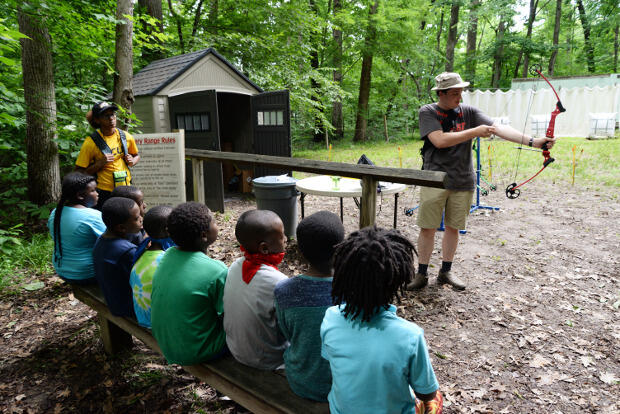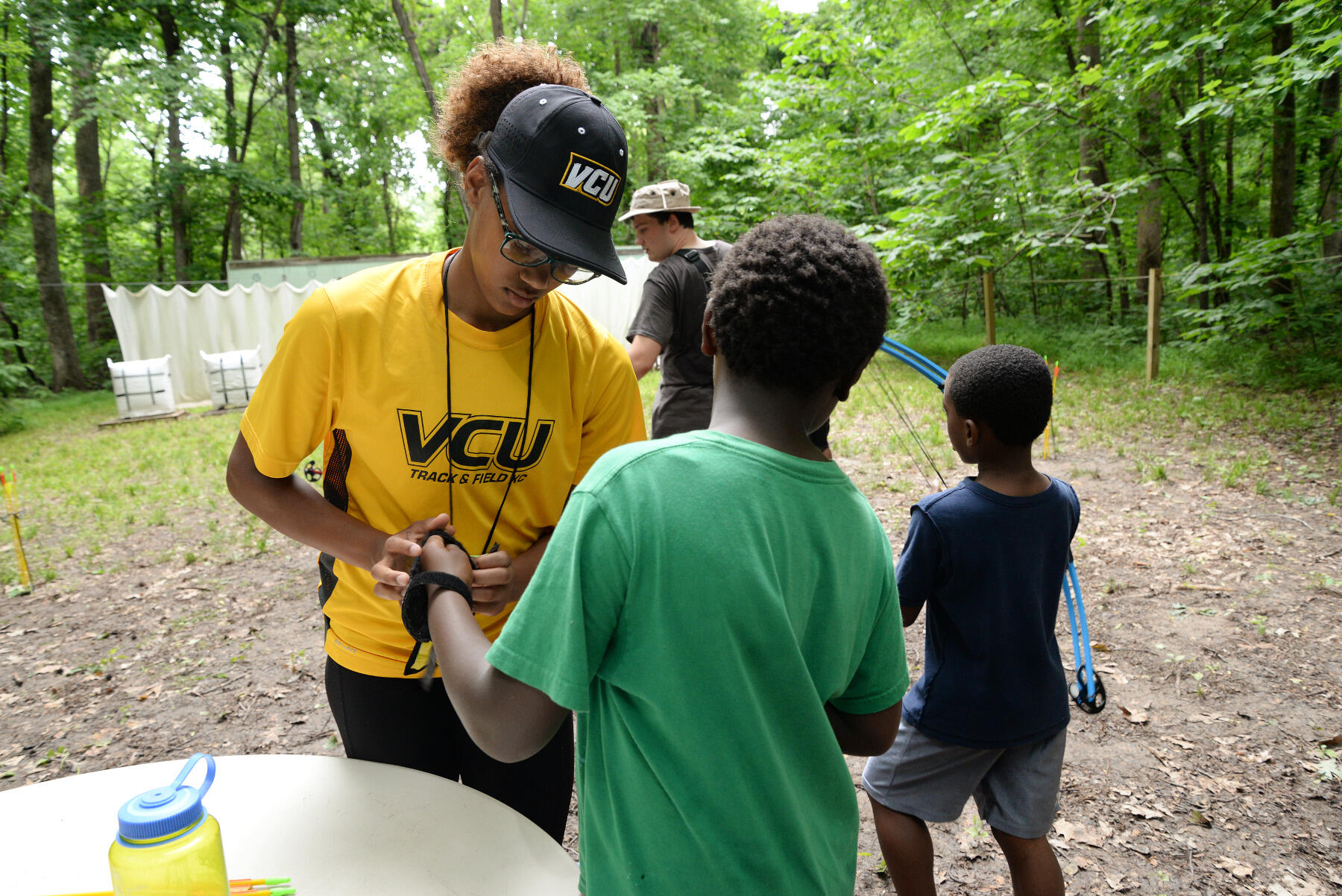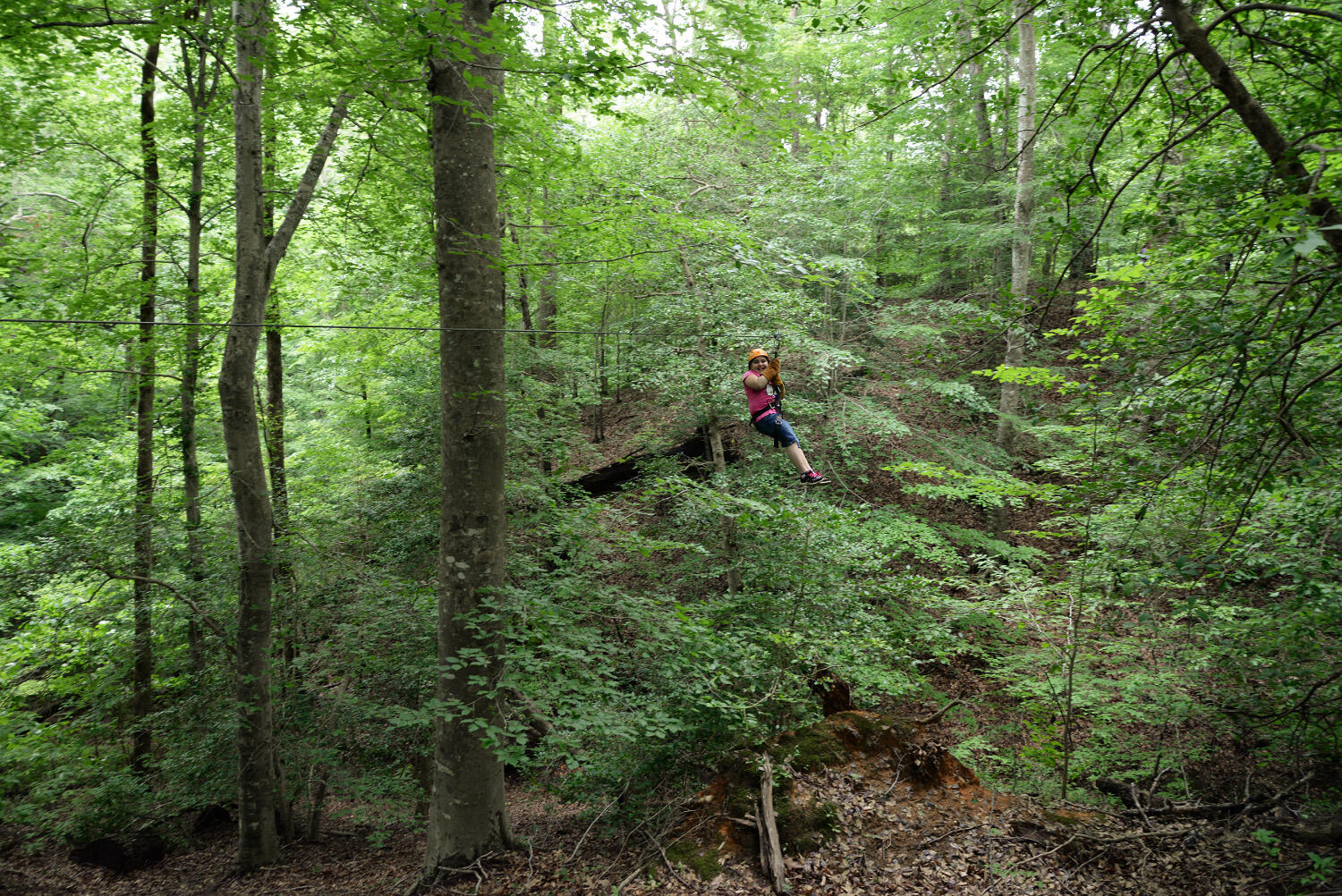
June 28, 2017
At summer camp, VCU students mentor Richmond-area children of incarcerated parents
Share this story
Gilberto, a Richmond elementary school student, is standing at the edge of a ravine at the Surry County camp Chanco on the James and is hooked to a zip line nicknamed “Wile E. Coyote.”
“Ready to fly!” Gilberto yells.
“Fly on,” a voice calls back from across the ravine, as Gilberto steps forward gingerly and zooms through the woods to the other side.
“Whew, I did it!” he said, greeted by a crowd of cheering children and Virginia Commonwealth University students.
Gilberto was among 32 campers from Richmond-area elementary schools who have an incarcerated parent. Through a program of the Virginia Conference of The United Methodist Church called “All God’s Children,” the children attended camp at Chanco on the James for a week, getting an opportunity to zip line, take nature walks, work on arts and crafts, canoe on the James River, practice archery and much more.
Mentoring the campers were 15 VCU students and recent graduates, most of whom were taking part through “Mentoring Children At-Risk,” a summer field study course taught by Geri Lotze, Ph.D., a teaching associate professor of developmental psychology in the Department of Psychology in the College of Humanities and Sciences.
“One of the biggest struggles for kids with incarcerated parents is relationships. Imagine if your mom — who is, in many cases, your primary caregiver — was incarcerated. Kids really struggle with that,” Lotze said. “So, here at camp, what they have is a one-to-one relationship with a VCU student mentor.”
It allows the children to come to camp and forget about the struggles at home and just be children again.
The camp is meant to serve as a sanctuary for children who face many challenges in their lives, including economic poverty, temporary living conditions, loneliness, low self-esteem, violence and drugs.
“This is such an important program because it allows the children to come to camp and forget about the struggles at home and just be children again,” said camp director Lori Smith. “It is also important because they attend a class each day where they learn about conflict resolution and self-esteem building, allowing them to use these tools and skills when they return home. Here at camp, they learn that they truly are somebody and really begin to live into that.”
Gilberto’s mentor, Leslie Golding, a junior psychology major, said she had no idea how quickly she would grow close to and care deeply about Gilberto and the other young campers.
“It’s only been a couple days, but I have bonds with all of them already,” she said. “Gilberto and I are really tight. He misses his mom a lot, so I think he feels appreciative that I’m there for him and making him feel less homesick. We had an especially fun time tubing yesterday, we went out on a banana boat. That was a really great time.”
While the camp only lasts a week, the experience often leads to a lasting relationship between the mentors and children, Lotze said.
“There’s been some interesting research looking at the impact of mentoring. One recent paper found that at-risk children who met with mentors a total of four hours each month for a year were positively impacted,” she said. “My students ask: ‘What kind of impact are we going to have in one week?’ And I tell them, ‘Count up the hours.’ We’re providing a one-to-one close relationship between at-risk children and a mentor for more hours this week than most mentors are able to provide in a year.”
For many of the mentors, the camp is just the beginning of their relationship with the camper.

“I have had VCU students mentor kids from the D.C. area [who attended a previous camp]. The VCU students would go up and visit them once a month and take them out for ice cream,” Lotze said.
“I’ll mail things [on behalf of] students. We’ll mail birthday cards, welcome back to school cards, they’re invited to take children out — as it’s OK with the children’s caregivers, of course. We encourage that.”
Jordan Schramm, who recently graduated from VCU with a psychology degree, attended last year’s camp as a student and decided to return this year as a volunteer.
“It’s nice to be a role model, be someone that they can look up to, especially when they might not necessarily have that sort of figure at home,” she said. “I still talk to my mentee [from last year]. We exchanged contact info after camp last year. That way, you can still be there for them after the camp experience is over.”
Schramm, like many of the VCU mentors, saw the camp partly as an opportunity to gain experience with working with at-risk children and to get a firsthand look at the effects of incarceration on families.
“I wanted to try out different experiences to try and find my career pathway with psychology and what I wanted to pursue my master’s in,” she said. “I’m going to be applying for my master’s in social work to start in fall of 2018 [at VCU].”
The best part, Schramm said, is that the camp provides the mentors with a chance to help children simply have a great time for a week in the summer.
“It’s nice to get to experience a week with them of things they don’t usually get to do,” she said. “For some of them, this might be most of the fun they get to experience this summer — and you get to be a part of that.”
Nora Schaefer, who graduated in May and majored in criminal justice at VCU’s L. Douglas Wilder School of Government and Public Affairs, also decided to volunteer this year after taking the class last summer.

“I wanted to do some service learning and work with youth,” she said. “At first, I took the class because I just needed a psych requirement, but I also [was interested] because it involves working with children of incarcerated parents. I really wanted to work with that population and understand what it’s like from the kids’ perspective and help them.”
The experience, Schaefer said, can be challenging, but also rewarding.
“You learn a lot about yourself. It can be a trial by fire or it can just be a joyful experience. But whatever happens, you learn about them and you learn about yourself,” she said.
“Last year,” she added, “[a camper who was] not my mentee but a different girl, she was worried that her mentor didn’t love her. I took her aside and assured her that her mentor loved her very much, and just calmed her down. It got through to her that we were all there for her, that she was looked after, and that she was loved.”
Kayleigh Smith, a junior psychology major, heard about the course while taking Lotze’s adult development class. She wanted to participate, she said, to explore what it’s like working with at-risk population but also because she loves working with kids.
“I went to summer camp as a kid myself and I remember how much my mentors meant to me,” she said. “So the idea of helping to make a summer awesome for a kid sounded like it’d be really cool.”
Golding, Gilberto’s mentor, encouraged other VCU students to sign up for the class next year.
“If you’re thinking about doing it next year, you definitely should,” she said. “It’s a great opportunity and I don’t regret it at all. Even though there’s no air conditioning.”
Subscribe for free to the VCU News email newsletter at http://newsletter.news.vcu.edu/ and receive a selection of stories, videos, photos, news clips and event listings in your inbox every Monday and Thursday during the academic year and every Thursday during the summer.
Subscribe to VCU News
Subscribe to VCU News at newsletter.vcu.edu and receive a selection of stories, videos, photos, news clips and event listings in your inbox.













